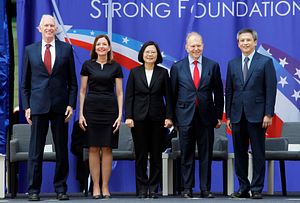On Monday, the United States moved toward the authorization of another arms sales package for Taiwan. While the move is significant in that it constitutes yet another notable move by the Trump administration in support of Taipei, it also obscures wider concerns about the future evolution of the U.S.-Taiwan relationship in the coming years.
Following the official switch of U.S. recognition from Taipei to Beijing in 1979 and the passage of the Taiwan Relations Act that same year, U.S. officials have attempted to balance preserving both an official relationship with China and an unofficial relationship with Taiwan, which Beijing sees as part of its territory under its notion of “One China.” Within those parameters, elements of U.S.-Taiwan relations have grown to extend across the economic, diplomatic, and people-to-people realms, even if the headlines often tend to focus more on the security aspect of ties.
Over the past few years, the rise of Chinese capabilities and Beijing’s growing willingness to exert pressure on Taiwan and Washington has intensified a broader debate across administrations about the strategic importance of U.S.-Taiwan relations. Though more nuanced, that debate is often caricatured as being between those who recognize Taipei as a key partner to engage either on its own terms or as part of a wider strategy with allies and partners directed against China, and those who see Taiwan as just a challenge to manage within the much-prized China relationship.
Amid the souring of cross-strait relations following the election of President Tsai Ing-wen and Beijing’s growing punitive campaign against the ruling DPP government, a number of significant moves have been taken to show support for Taiwan under the Trump administration, alongside a tougher approach toward China as well. Those steps include passing the Taiwan Travel Act, opening up a new complex for the American Institute in Taiwan, and authorizing new arms sales such as the one we saw this week. As notable as these individual actions are, they also need to be kept in perspective in order to evaluate their significance for the future of U.S.-Taiwan ties.
The first question relates to the coherence and sustainability of U.S. Taiwan policy under the Trump administration itself. While key officials within the administration may be sympathetic to Taiwan, there have been lingering doubts about the extent to which this sentiment is shared by Trump himself, and, thus, how this may impact policy. Irrespective of how true they may or may not be, those doubts can both undercut the longer-term credibility of U.S. commitment that individual moves such as arms sales are meant to demonstrate, while also raising concerns about actions not taken, with a case in point being the brouhaha over the non-attendance of a cabinet-level official at the opening of the new AIT building.
The second question concerns how actions such as arms sales will balance out against the sum of actions Beijing is taking against Taiwan. While the Trump administration has proved willing to move forward with moves such as new arms sales or increasing contacts with Taiwanese officials, these actions, which can take some time to take effect, can merely mitigate the wide asymmetry across the board to Taiwan’s disadvantage – be it the cross-strait military imbalance or the resources Taipei has to advance diplomatic ties. This is why advocates of Taiwan have suggested that existing moves are not enough, and that bolder steps, such as regularizing the process for arms sales, need to be taken urgently if they are to have any real meaningful effect for U.S.-Taiwan relations and cross-strait ties moving forward.
The third question relates to the longer-term future of the U.S.-Taiwan relationship, and its implications for Taiwan’s security. Administration-specific moves such as arms sales cannot conceal the reality that there is still a lack of consensus within the U.S. policymaking community about the extent to which Taiwan matters and the degree to which Taipei ought to be sustainably supported as an American partner. This is not a mere existential point; it has real policymaking impact even today. To take just one example, while U.S. officials are right to suggest that Taipei should do more for its own defense, it would be easier for Taiwanese defense planners to do so if they were confident about what Taiwan’s future position was within U.S. Asia policy: whether as a partner engaged only in a limited bilateral sense; a true part of a wider U.S. network of allies and partners; a bargaining chip or card to play in U.S.-China relations; or just a nuisance getting in the way of better ties between Washington and Beijing.
This is not to say that the Trump administration does not deserve credit for the actions it has taken thus far with respect to Taiwan; some of these individual actions are no doubt significant. But the hype surrounding individual moves needs to be matched with careful attention to the broader dynamics at play within the U.S.-Taiwan relations, along with the actions of other actors as well not discussed here, including China, other U.S. allies, partners, and like-minded states, and, indeed, Taiwan itself, which, under Tsai, has begun taking more initiatives of its own to protect against overdependence on China and strangulation of its diplomatic space. Only then can one truly assess the significance of such developments in a meaningful way.

































